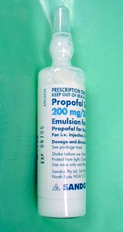
Most people had never heard of the drug propofol until Michael Jackson died from an overdose. His doctor was recently convicted and sentenced for being reckless when he administered the general anesthetic.
Since Jackson's death, several scientific papers have begun urging the US Drug Enforcement Administration to regulate the drug. You may already be asking, though - why would anyone use propofol recreationally?
Within seconds, it acts on a person's central nervous system, sedating them. A mistake can cause a drop in blood pressure, obstructed airway, respiratory failure, and even death. With such high risks, propofol does seem only useful in medical settings on surgical and intensive care patients who are highly monitored.

Before officials could classify it a controlled substance, they'd have to ask, "Is propofol being abused?" One condition for abuse is first documenting recreational use. Recent scientific papers cite medical personnel abusing propofol. Several involve anesthesiologists where one in particular self injected 10 to 15 times daily, and another died of an overdose at the hospital where she worked.
A study in the 1980s tried to establish propofol's potential for abuse. The people given propofol described positive feelings ranging from euphoria to sexual disinhibition. The study concluded propofol may be addictive.
Officials would also need to establish withdrawal symptoms and tolerance. In past studies, people taken off propofol had anxiety, hallucinations, and intense food cravings. A few studies, limited to the intensive care unit, suggest patients grew tolerant to the drug.
But there's just not enough data to prove either withdrawal or tolerance for propofol exist. Over the years, propofol use has increased mostly because it's available, works quickly and doesn't last long. These properties make hiding propofol abuse very easy, especially for medical personnel with access. That could all change if propofol becomes a controlled substance.
More Information
Propofol and the Death of Michael Jackson
Article by Aidan O'Donnell, published by Oxford University Press, explaining that propofol is safe and highly useful in the hands of anesthesiologists and trained medical personnel, but should be administered in the hospital.
Clinical Effects and Lethal and Forensic Aspects of Propofol
Levy, Richard J. "Clinical Effects and Lethal and Forensic Aspects of Propofol." Journal of Forensic Sciences (2011); vol 56: S142-147.
The Abuse Potential of Propofol
Wilson, Courtney, Peter Canning, and E. Martin Caravati. "The Abuse Potential of Propofol." Clinical Toxicology 48.3 (2010): 165-70.